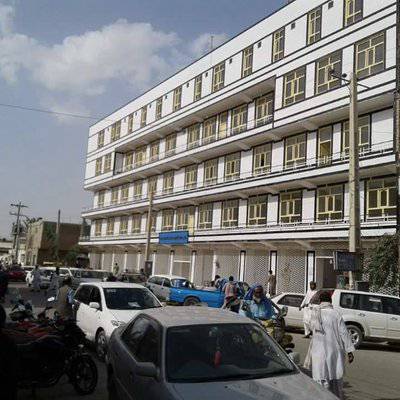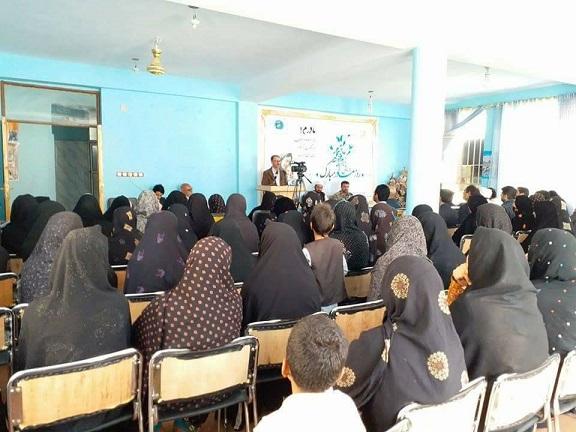ZARANJ (Pajhwok): The number of women working in government offices has increased in southwestern Nimroz province, despite little work on females’ capacity building.
Local officials say the women in Nimroz had played an active role in the previous provincial council and presidential elections. Over 50,000 people took part in the elections in Nimroz, with 40 percent of them women.
By the virtue of continued civic activities by women, more females have started joining government offices in Nimroz.
Statistics provided by the Women’s Affairs Department of Nimroz show currently more than 2,000 women work in different government departments in the province.
Some 1,750 females work as teachers and other staff in the education sector while 150 other women discharge their duty as doctors, nurses and midwive.
According to Pajhwok Afghan News finding, eight women are working at the Women’s Affairs Department, 50 in police, five in justice department, as many in the agriculture department, 19 in women’s affairs department and one in the judiciary.
The statistics, however, show over 1,000 women worked in state institutions, including the education sector, two years ago in Nimroz.
Two women represent the people of Nimroz in the Wolesi Jirga, as many in the provincial council and two work as attorney officers.
Malali Ahmadi, acting director of the Women Affairs Director, said the number of female employees in government offices had surged by two fold compared to last year and now women actively participated in political, economical, educational and cultural activities.
She said incapability of state institutions to absorb more employee, geographical location of Nimroz, decline in foreign assistance and other issues did not allow women to have a greater presence in state institutions, but the present scenario was also not bad.
She said her department often asked the private sector to give women chances to work specially in carpet industry.
Ahmadi believed more women would get chances of work if development projects were implemented and more positions created in state institutions.
Women’s interest to work in government departments:
Farida Hameedi, a lawmaker from Nimroz province, said Nimroz women were interested to work in every sector, but there was the need for capacity building and awareness programmes regarding their due rights.
“Today women have been defending their rights in a best manner compared to the past and they have realized the fact that women should work alongside men for the economic development of their families.”
She said there were more educated women in Nimroz who wanted to work alongside their brothers without any kind of discrimination.
Ferishta, a teacher at Farkhi High School in Zaranj, the provincial capital, said women were more interested to work government and private organizations.
In the past, most families considered it a shame to allow their daughters to work at government offices, but thanks to awareness programs, families and women came to know about the crucial role women could play in economic development of their families.
She added a large number of women worked as teachers at schools and their families had no problem with them. “Many families want their female members to work, but traditional norms a hurdle.”
But Gul Ahmad, a resident of Zaranj whose wife is a teacher and his daughter works at a government office, believed women could work in government offices by wearing Islamic hijab. “The purpose of women work is to serve the people and women do it effectively,” he added.
Naseema, another dweller of Zaranj, said she had been working at a government office for the past two years. He said the women of Nimroz were more interested to work in government offices for two reasons.
“The first reason is to improve economic situation of their families and secondly to share their problems with female colleagues.”
She said growing unemployment among men forced women to take the responsibility of providing alimony to their families.
However, a large number of girls and women with higher education degrees and work experience are seeking jobs in government offices in Nimroz.
Samira, who graduated from a high school two years ago, said she could not continue her higher studies due to her economic problems but she had high interest to work outside.
“I am searching for a job, I want to be employed at least as a school teacher, but I could not elicit any hopeful response despite knocking at many doors,” she said.
She said hundreds of girls and women were jobless in Nimroz but no one paid attention to them.
Provincial council members recalled thousands of Nimroz women braved threats and problems to play their role in past elections.
Massoud Hakimi, a provincial council member, said women of the province always stood alongside their men in most of livelihood activities and a percentage of employment had to be reserved for women.
“The government should create jobs for Nimroz women because most of the women here are interested in work outside home and some have lost their husbands and need support for their children,” he said.
He said he would work with the local government to increase job opportunities for women in Nimroz.
Women’s presence is on the rise in Nimroz government offices
Civil society has been paid little attention with regard to women’s capacity building, but the number of female workers in government offices is on the increase.
Abdul Hadi Baidar, a civil society activist, said public awareness programs helped increase women’s participation in government offices. Poverty and joblessness among men were other factors behind women’s increased presence in government offices, he added.
“Women form half of the society and their presence is essential in all organs, particularly in education and information and culture departments and judiciary organs,” he said.
However, another civil society activist, Shah Gul Gulzar, criticized local government for failing to provide job opportunities to women who she said performed heavy household tasks.
“A large number of women are suffering from poverty, so they should be paid attention, this issue has been shared with relevant organs several times, but no action has so far been taken,” she said.
Former provincial women’s affairs director, Amina Hakimi, said women’s employment was paid less attention, but the women did not stay silent as they ran more than 200 beauty shops and 150 other women received hairdressing training in recent years in Nimroz.
Local government’s performance in building women’s capacity
Nimroz Governor Mohammad Samay, who took over two years ago, said he had tried to increase women’s participation in government organs.
“I invited women in all my general meetings to work alongside their brothers, we also hold meetings on weekly basis for discussing women’s problems in the governor’s house,” he said.
He said a woman was introduced as a prosecutor to the provincial attorney office for the first time and the number of women officers was increased in government offices, particularly in the education department over the last two years.
“Women have an active role in the decision making on issues on provincial level and their suggestions and views are considered”, he said.
Samay said more than 500 women received training and needed equipment in building gardens at homes. Another 500 women received baby chickens, equipment and food to raise them for their economic improvement, he concluded.
nh/mds/ma
Views: 11









GET IN TOUCH
NEWSLETTER
SUGGEST A STORY
PAJHWOK MOBILE APP